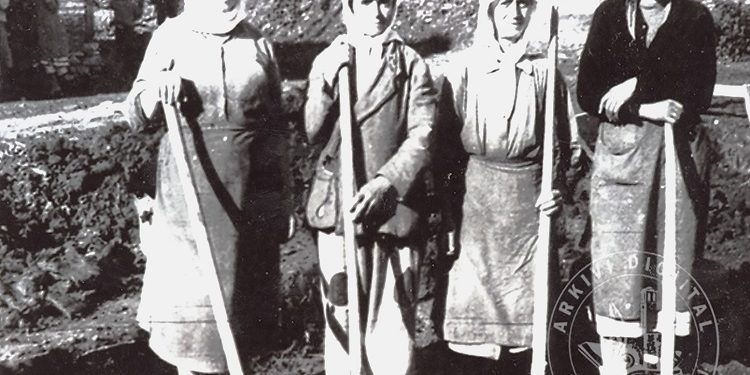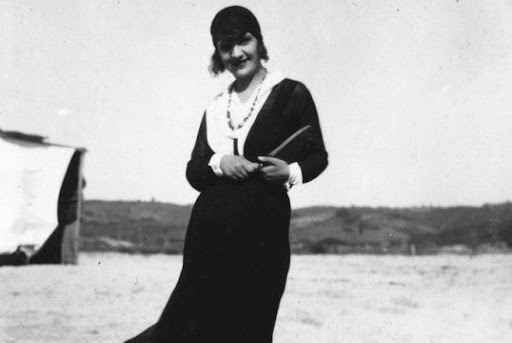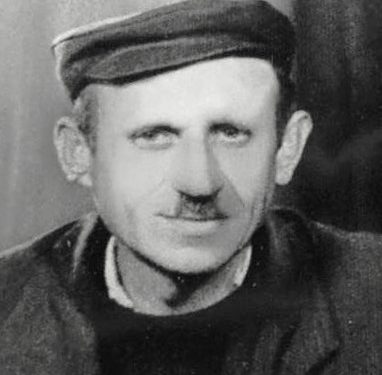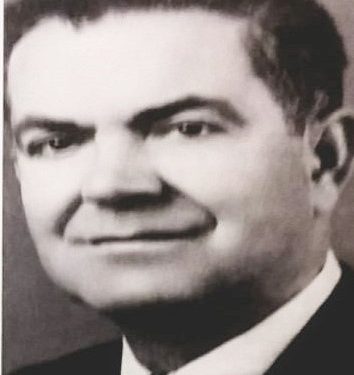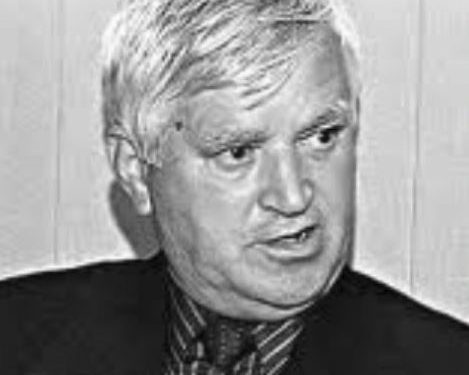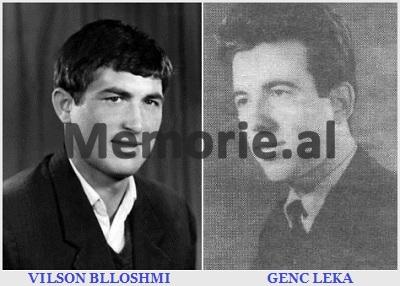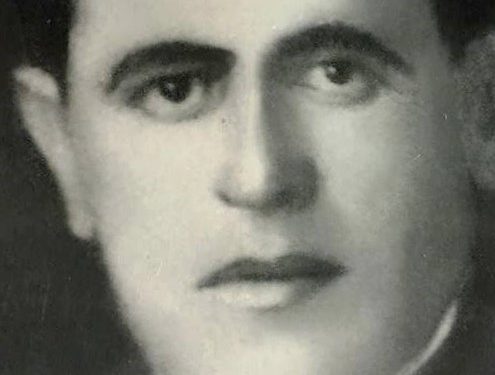By Ledia LLESHI
Memorie.al / Yllka have felt the consequences herself as a descendant of one of the branches of the large trunk of the Blloshmi family. She was little when, on the day of the liberation of Tirana on November 17, her father was shot without trial. For 50 years, the family would not learn the truth about the shooting of Shahin Blloshmi, who had been a high-ranking military officer, but they would also face persecution and a difficult life. Her grandmother and mother would not gain the right to work other than shoveling, digging ditches, picking and doing the most difficult jobs to at least be able to feed their two young orphaned children.
What the family was told about Shahin Blloshmi was his escape, not the shooting. Only after the 90s did his daughter Yllka learn that her father had been shot, while his body and remains were never found. The history of persecution, suffering, persecution and difficulties for the descendants of the Blloshmi is told by Yllka, who, although she married a man with a clean biography, was fired twice from her job as a teacher and would only return to this profession in democracy. Yllka, her suckling, speaks about the entire history of the suffering of the Blloshmi family.
What was the fate of the Blloshmi?
My grandfather was shot along with other Blloshmi patriots, in the events of Dunica in 1943. My father, Shahin Blloshmi, finished high school in Athens, while he continued his military academy in Turin. He graduated with excellent grades and spoke three foreign languages. Upon returning to Albania, he initially joined the army where he received the rank of captain. He served in Shkodër, Tirana and finally in Elbasan. During the time of Selaudin Blloshmi, who was a senior military officer during the Zog period, he served in the National Army. In 1944, on November 17, my father was in Tirana where he was shot along with many other military personnel.
We learned nothing from that day and were told that he had escaped, but my father had been killed without trial by the communists, on the same day as the liberation of Tirana. The military personnel were the first victims of the communists. At the same time, Haziz Selman Blloshmi, other military personnel, was also shot. All the Blloshmi members were persecuted and killed. They had completed their studies in the West and could not accept the communist deviation, rejecting democratic ideas. We learned about my father’s murder only after the advent of democracy, since for the communists, he had escaped.
How did your mother react to the first elections in the communist system?
Grandma Makja and my mother, Safetja, went to vote and as children we followed them, playing, as the elections were accompanied by celebration. They were the first elections after liberation, in 1946, and the voting system was through ballot boxes, in order to distinguish all those who were against the regime. In the house where the voting was held, two boxes were placed, a red one representing the Front and the other black, where votes were cast against. While cotton was placed in the red box, the black box was deliberately not placed and the ballot boxes creaked. My mother voted against, after dropping the ballot box into the black box. While we were targeted because of my father, this was enough for the family to be put under the surveillance of the enemies of the people.
How did the two Blloshmi women live after this event?
My grandmother and mother, who after the shooting of her father were left a widow at the age of 22 with two babies, relied on each other, working in the most difficult jobs that even men could not do. My mother came from the Agolli family of Pogradec, which also had the same fate, being persecuted by communism. My mother worked all her life in olive groves, in canals, on the Shkumbini dams and in other destructive work. While building an ambush in the Shkumbini water, she was swept away by the water and only a good man from Elbasan saved her. Until she retired, she made sure that we grew up well and even though she lived through extreme hardships, she did not lose the dignity and values of the family where she lived and from where she came from.
How were you fired?
I finished school in 1958 and was appointed to the Fier district. After I got engaged, I came to Elbasan. In 1966, I was fired for the first time from education, with the reason “undesirable” for education. I was unemployed for six years and was sent to the farm. This was a very difficult period for me, but I really appreciate my husband, who always told me not to lower my head, since I had done nothing wrong. The second dismissal came after I was able to return and the reason written in my biography was; “dishonest”. In fact, I had written in the documents that my father had escaped, as they had told us, but this was not enough to prevent the decision to dismiss him along with several other colleagues, who had the same fate. My children also did not escape persecution.
I remember a case when the girl was at school, she was selected to be honored on May 5, and her father made a bouquet, which we kept all night. In the morning she took the bouquet and left, but on the way a teacher told her to turn back, as it was not necessary. My children were not able to continue their higher education. Only in democracy did they manage to study and graduate. I also returned to the teaching profession in democracy and only in 1997, I was able to retire. Like us, many other Blloshmi descendants were persecuted. I would remember Genc Blloshmi, who was shot in 1979. As part of the Blloshmi gang, he was targeted and his poems were deeply analyzed, as he had a bad biography.
Pogradec representative Hajdar Blloshmi, the only delegate in the Vlora Assembly
In the minutes of the National Assembly, published in the newspaper (“Përlindja e Shqipëria”, Year II, No. 10, dated February 14, 1914 and according to “Historical Documents” by Lef Nosi, No. 4, pages 119-125, June 1924, and No. 5, pages 152-157, July 1924, Elbasan, as well as materials from the State Archive), it is written that many delegates from all over the country participated in the Vlora Assembly. The minutes contain prominent names in Albanian history. Among those who attended one of the country’s jubilee events was Hajdar Blloshmi, a scion of the large Blloshmi family.
Shaban Blloshmi, the story of the close friend of the Frashëri brothers
The Kaçak teacher who fought in the mountains for freedom and the Albanian language. During the last period of the National Renaissance, in the territories of Elbasan, Struga, Ohrid, Dibra, Manastir, Pogradec and Korça, the figure of the distinguished patriot Shaban Blloshmi from Bërzeshta and Librazhd stood out. A consistent patriot and democrat, who sacrificed everything, even sacrificing his life, for the freedom and progress of the Fatherland. Shaban Blloshmi was born in 1882 in the village of Bërzeshta into a well-known and distinguished family. Shaban received his first lessons in the city of Ohrid and then continued them in the capital of the Turkish Empire, in Istanbul.
During his stay in Istanbul, through two of his prominent fellow villagers, who were friends of the Frashëri brothers (Naimit and Sami), the young Shaban Blloshmi was connected to patriotic circles, where he learned to write and read the beautiful Albanian language. After returning to his homeland, Shaban resolutely engaged in patriotic activities, dedicating himself to the implementation of the National Renaissance Program. Shaban Blloshmi worked resolutely for the spread of Albanian education in all the regions of Elbasan, Pogradec, Struga and Korça. In collaboration with the patriot Dervish Hima, they opened the first Albanian school in the village of Bërzeshtë, in the premises of Shaban’s house.
He constantly asked the Albanian patriots of Manastir for Albanian primers and books for the schools of the villages of the regions of Çermenika, Qukës, Mokra, Struga, etc. Shaban Blloshmi established an armed cadre of komites, which carried out many combat actions. During his time as a kaçak, komite, as they were called at the time, and leader of the patriotic cadre, he was also constantly interested in the spread and teaching of the Albanian language. Being both a Kaçak and a teacher at the same time, Shaban was called the “Kaçak teacher” (The well-known intellectual from Elbasan, Lef Nosi, commemorating the figure of Shaban Blloshmi, would write in his memoirs: “The deeds of this patriot do not belong to any history or monument, but are among those known to anyone who is concerned with the idea of sacred national deeds…”!
In 1913, a partisan commander in Elbasan against the Assadist rebels, in 1914 a partisan commander against the rebels in Qafë Thanë, in the same year, he fought against the Greek Epirotes in Arrëz in Korçë and others…! In 1916, a partisan commander of Albanians against the Austro-Hungarians…! AQSH, Fondi 32, Dosja 50).
In 1920, he was elected a delegate to the Congress of Lushnja, representing the district of Starova (Pogradec), which included Qukësi and Bërzeshta. In order to implement the decisions of the Congress of Lushnja, Shaban Blloshmi returned to Starova, Qukësi and Bërzeshta and organized the people of these areas, sending volunteers to fight against Italian imperialism, which had occupied Vlora. In the 1920s, Shaban Blloshmi became active in the country’s democratic movements.
He connected with the most progressive intelligentsia circles of the city of Elbasan, creating the group, “Neither the pasha’s nor the bey’s”, which included Aleksandër Xhuvani, Sali Ceka, Ibrahim Dedei, Qazim Dyrmishi, Kostaq Cipo, etc. In 1924, Shaban Blloshmi supported the anti-Zogist movement led and directed by Fan Nolin. During the time of the Fanolist movement, Shaban Blloshmi had made many opponents and enemies, some of whom were even in the highest spheres of power at that time. In a letter he sent to his friends from Elbasan, Lef Nosi and Ahmet Dakli, Shaban Blloshmi would write: “They have been working underground for some time with every means and method to eliminate me from the face of the earth…”! Shaban Blloshmi’s enemies ambushed him near his house and killed him on November 5, 1929.
Selaudin Blloshmi, King Zog’s most trusted military man
Selaudin Blloshmi was one of King Zog’s most trusted military men. On December 14, 1923, military forces commanded by Koço Kotta attacked and entered Kapshtica. The forces led by Myfit bey Libohova attacked from Kakavija, while those led by Selahudin Blloshmi attacked from Qafë-Thana. Through a rapid march, the three columns, after weak resistance, marched towards Tirana, bringing Zog to the front. Selahudin Blloshmi was married for the second time, to Ismail Qemali’s niece, Sara. He met Sara while he was studying in Egypt.
He was one of the most handsome boys and the love between them caught the attention of the King himself, who brought them closer to the Royal Court. From this marriage Vera Blloshmi was born. On the eve of liberation, his family settled in England. Only in democracy did Sara and Selahudin’s daughter return to Albania. Already a prominent painter, Vera had also met her sisters in Elbasan. One of the descendants of the Ismail Qemali and Blloshmi families of Elbasan, she passed away in 1998. Memorie.al
Shooted in Dunica 1943
Shefqet Blloshmi
Bajram Blloshmi
Selman Blloshmi
Sabri Blloshmi
Haki Blloshmi
Hazis Blloshmi
Killed on November 17, 1944
Shahin Blloshmi




